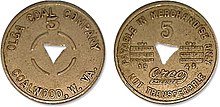From Wikipedia, the free encyclopedia
In the United States, mining and logging camps were typically created, owned and operated by a single company. These remote locations were cash poor and workers had very little choice but to purchase goods at a company store. With this economic monopoly, the employer could place large markups on goods, making workers dependent on the company, thus enforcing employee "loyalty".
Contents |
[edit] Lumber Company Scrip
In the forests of nineteenth century United States, ready cash was frequently hard to come by. This was especially true in lumber camps, where workers were often paid in company-issued scrip rather than United States currency.[1]In Wisconsin, for example, lumber companies were specifically exempted from the state statute requiring employers to pay wages weekly or bi-weekly in cash.[2] Lumber companies frequently paid their workers in scrip redeemable at the company store. Company-run stores served not just as a convenience for men often working miles away from the nearest settlement, but also allowed employers to recapture some of their labor expenses. In some cases, employers included contract provisions requiring workers to patronize their stores. Workers wishing to convert their scrip to cash generally had to do so at a discount.[3]
Scrip was redeemable in lumber as well as merchandise. Such an option may have appealed to new settlers in the region, who worked in the lumber camps in winter to earn enough money to establish a farm. Taking some of their wages in lumber may have helped them build a much-needed house or barn.[4]
[edit] Modern Practice
The practice continues today. On September 4, 2008, the Mexican Supreme Court of Justice ruled that Wal-Mart de Mexico, the Mexican subsidiary of Wal-Mart, must cease paying its employees in part with vouchers redeemable only at Wal-Mart stores.[5][edit] See also
[edit] References
- ^ http://www.wisconsinhistory.org/museum/artifacts/archives/003221.asp | Wisconsin Historical Society
- ^ http://www.wisconsinhistory.org/museum/artifacts/archives/003221.asp | Wisconsin Historical Society
- ^ http://www.wisconsinhistory.org/museum/artifacts/archives/003221.asp | Wisconsin Historical Society
- ^ http://www.wisconsinhistory.org/museum/artifacts/archives/003221.asp | Wisconsin Historical Society
- ^ Shaulis, Joe (2008-09-05). "Mexico Supreme Court orders Wal-Mart to stop paying workers in store vouchers". Jurist. Retrieved 2011-06-10.
| This money or currency-related article is a stub. You can help Wikipedia by expanding it. |
| This business-related article is a stub. You can help Wikipedia by expanding it. |
| This human rights-related article is a stub. You can help Wikipedia by expanding it. |

No comments:
Post a Comment